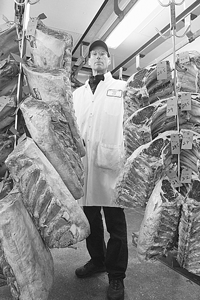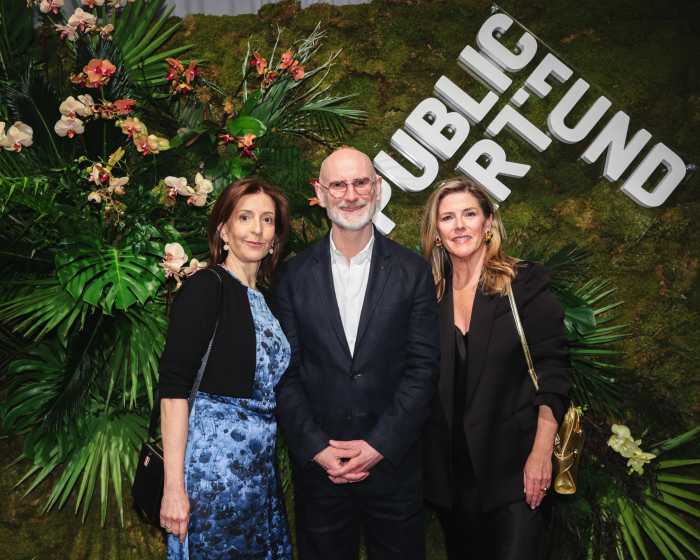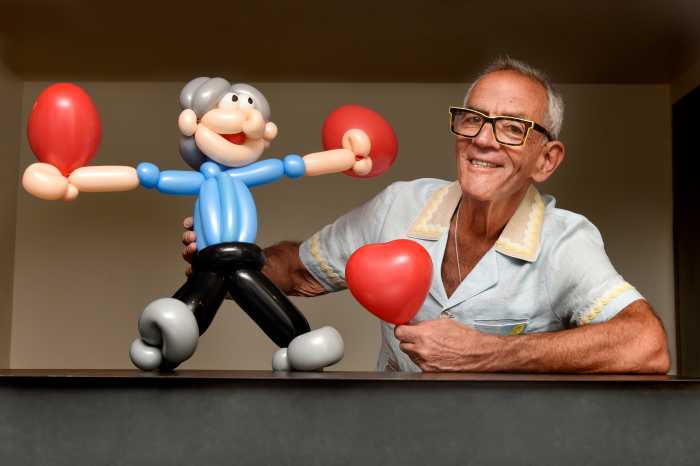By Lincoln Anderson
The price of beef hasn’t changed much over the past year, and neither has the state of the meat businesses in the Meat Market. The number of meat businesses is holding steady at somewhere under 20, down from a historic high of 150 in the 1950s.
The 12 meat businesses in the city-owned co-op building at Little W. 12th St. between West and Washington Sts. are secure, at least for the next decade, since they have a lease for that long from the city — and probably beyond, since the block carries a restriction for market use dating to when the Astor family deeded the property to the city.
But the handful of meatpackers outside the co-op in privately owned buildings will likely face tough decisions within the next couple of years. Most have only a year or two left on their leases, and their future in the Meat Market depends on the whim of their landlords.
In the only significant changes in the last year, Dave’s Quality Veal found a home in the co-op building after its landlord on 13th St. rented to a high-end tattoo T-shirt shop, while Steve Diamond, who had a meat cooler on Washington St., retired and moved South.
The Dave’s Quality Veal sign has been left on the outside wall by the new T-shirt place “for authenticity,” said landlord Mike Meilman.
Once 14th St. teemed with meat businesses and was always snarled with truck traffic. Today, just one meat business, M&W, remains on the street.
“So far, we are here to stay,” said Maurice Benous, M&W’s owner, early last Friday morning as men with vans hustled in and out of his cooler with boxes of hamburger patties bound for delis and restaurants. Luckily, he owns the building.
“That’s the reason I am still here,” he said. “Otherwise, they would throw me out like the rest.” Benous predicts the half-dozen meat businesses outside the co-op building will be gone in a year or two.
Benous said it’s his understanding that the Romanoffs, who own the property where Atlas and Interstate, two remaining meat companies, are located on 13th St., don’t plan to renew the leases. “They already have a plan” for the site — through which the High Line runs — Benous said of the Romanoffs. The Romanoffs couldn’t be reached for comment by deadline.
Another spot where meat businesses maintain a toehold is in a building at Washington and 13th Sts., across from the huge site where construction recently started on Andre Balazs’s The Standard hotel. About four meatpackers remain here, including Lamb Unlimited, R&W, Daily Wholesale Meat and Walmer.
Bob Wilkins, Lamb Unlimited’s owner, says he’s hoping to stay on Washington St. as long as he can and has a great relationship with his landlord, James Ortenzio.
Speaking from inside his office inside the cooler — a bit like Danny De Vito’s dispatcher booth in “Taxi” — Wilkins said, “Nothing has changed on our lease…. Right now, we’re here as long as we can.
“Give him $1 on the beef and 80 cents on the flank,” Wilkins called out to a worker filling an order.
The hotel construction hasn’t had a negative impact on them, Wilkins said, since the entrance to the work site is on Gansevoort St. and construction equipment is being kept on West St.
“If and when the hotel goes up, I’ll be the first person knocking on their door,” he said, looking forward to having a major new customer.
Asked how his lease situation was looking, Joe, the owner of Atlas meats, shrugged, “There are a lot of things in the air — it’ll all fall into place. All I know is we have a lease, we’re paying rent and he’s honoring the lease.”
Ortenzio was found in his office in the co-op last Friday. Though he relocated his meat businesses outside the city years ago, he’s still known as the Mayor of the Meat Market. A man of many hats, he had just arrived from his other office, where he dons the cap of Manhattan County Republican Party chairperson. Until a few years ago, Ortenzio, who lives in the Village, was also chairperson of the Hudson River Park Trust, the state-city organization building the Lower Manhattan waterfront park.
Ortenzio feels the High Line Park has been the most significant story in the Meat Market over the last year.
“I have not ever seen better communication between a municipality, a mayor’s office and a project,” he said. “To me, the big news, the quiet news, is that the High Line [project] got put together, the funding is committed and work began — unusual,” he noted, adding it took “25 years” to rebuild the West Side Highway.
As for his own property, last year, a plan for a movie theater was floated for his Washington St. building. He claims he had nothing to do with this and that it was a broker putting out feelers. But Ortenzio ultimately rejected the idea, saying he doesn’t want a “single-use building.”
“It’s probably a retail site,” he said. As for whether the meat businesses there will stay or go, he said, “I keep my commitments…. I gave five-year leases. They have a year and a half left — and they’ll figure it out.”
Ortenzio likes the Dia Museum project planned on Gansevoort St. The refrigeration plant for the co-op would need to be moved for it, but that shouldn’t be difficult, he said. He also likes smaller changes, like the new flower store at the corner of Washington and Gansevoort Sts. in a building owned by the Gottlieb company.
John Jobbagy, owner of Jobbagy meat company and president of the Meat Market co-op, said the co-op supports having Dia on the block.
“We think it’s a good idea, and we support that they want meat space on West St., that they want to keep some meat coolers there,” he said. “We think there’s certainly enough nightlife and other establishments down here,” he added.
The day’s deliveries had been unloaded and sacked away hours earlier in the coolers, and Jobbagy was filling orders early last Friday afternoon, fielding phone calls from customers for turkeys and “heavy meat” as opposed to “light meat.”
Without the protection of the co-op, Jobbagy agrees, he and the others in the building wouldn’t have much longer to stay in the Market.
“The economics of the industry — we’re not a retail industry, so you can’t pay retail rents,” he said. “Clearly, the reason the Meat Market isn’t staying is because the landlords are choosing to rent out to tenants who are retail people.”
Times have certainly changed, and Jobbagy, like the other meat business owners, most of them second- or third-generation proprietors, have witnessed it.
“I was down here since I was a kid,” said Jobbagy. “There was so much truck traffic, it used to take you a half-hour just to go from Ninth Ave. to Washington St.
“I was down here when there wasn’t an empty cooler.”




































